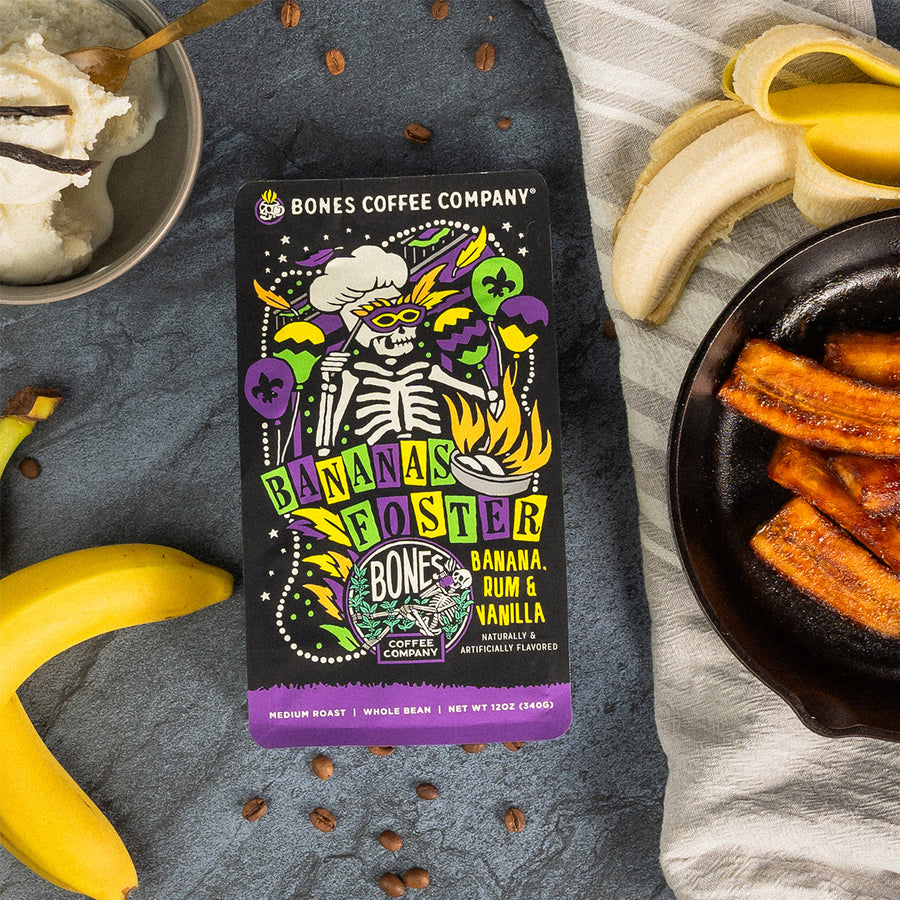Yes, coffee can make you nauseous, and if you've ever felt that uncomfortable, queasy sensation after your morning cup, you're not alone. Many coffee lovers experience this unpleasant side effect, whether it's from drinking on an empty stomach, consuming too much caffeine, or being sensitive to coffee's natural acidity.
The good news? Coffee-induced nausea is usually preventable and manageable once you understand what's causing it. In this guide, Bones Coffee Company breaks down the most common reasons coffee may upset your stomach, along with practical tips to help you prevent nausea before it starts.
Why Drinking Coffee Makes Some People Nauseous
The truth is, coffee nausea isn't just "all in your head." There are real reasons why your favorite morning brew might sometimes turn your stomach into a churning mess. Understanding these causes can help you transform your coffee experience from a risky gamble into a consistently enjoyable ritual.
Caffeine Sensitivity
Individual caffeine sensitivity varies dramatically from person to person. Some coffee lovers can down a double shot of espresso and feel perfectly fine, while others might feel queasy after just a few sips of a mild medium roast. This isn't about being "weak" or "strong." It's about genetics, body weight, metabolism, and how regularly you consume caffeine.
The key is understanding that caffeine sensitivity isn't a character flaw. It's simply your body's unique way of processing this powerful compound. Once you know how your system responds, you can make informed choices about timing, quantity, and coffee types that work best for your individual tolerance level.
Coffee Acidity Level
Coffee naturally contains several acids, including chlorogenic acid, quinic acid, and citric acid. These aren't the harsh, burn-your-tongue kind of acids. They're the flavorful compounds that create those delightful tangy notes you taste in your morning brew. However, when these acids hit your stomach, they can trigger increased stomach acid production, which is like adding fuel to an already sensitive fire.
A 2017 study published in Proceedings of the National Academy of Sciences found that caffeine activates bitter taste receptors called TAS2Rs, located in both the mouth and stomach, which directly stimulate gastric acid secretion:
“Our results clearly demonstrate that the route of application of caffeine determines its effects on gastric acid secretion, and suggest that other bitter tastants and bitter-masking compounds are also potentially useful therapeutics to regulate gastric pH.”
— Liszt et al., 2017
If you're someone whose digestive system stages a rebellion every time you drink coffee, don't despair! Understanding acidity levels means you can become a coffee detective, experimenting with different roasts, brewing methods, and even brands to find your perfect, stomach-friendly match. Your morning ritual doesn't have to be a battle between your taste buds and your tummy.
Drinking Coffee on an Empty Stomach
When your stomach is empty, it's essentially a blank canvas waiting for whatever you throw at it. Coffee, with all its bold, acidic glory, hits that empty stomach like a surprise guest who didn't get the memo about being gentle.
This doesn't mean you have to break up with your beloved morning ritual. It just means you might need to switch up your approach to avoid overwhelming your digestive system. Even something as simple as having a few crackers or a piece of toast before your coffee can make a world of difference.
Some preparation styles can also be gentler on an empty stomach than others. Cold brew, for instance, tends to be less acidic than hot-brewed coffee, making it a friendlier option for sensitive stomachs.
Drinking Plenty of Coffee Quickly
When your coffee intake is too quick, you're basically giving your digestive system a caffeine shock that it wasn't prepared for. Think of it like cannonballing into a cold pool versus easing in slowly. One will leave you gasping, while the other will let you adjust comfortably.
The rapid caffeine hit is the main culprit here. When you drink coffee fast, especially on an empty stomach, you're flooding your system with caffeine all at once. Temperature plays a sneaky role as well. That piping hot coffee you're downing might feel comforting going down, but it can actually irritate your stomach lining and contribute to nausea.
All this is totally fixable. Try sipping your coffee slowly, like you're actually tasting those amazing flavors. Speaking of gentle coffee experiences, here are some of Bones Coffee Company’s coffee products that are perfect for slow sipping:
How to Prevent Coffee-Induced Nausea
If your favorite cup of coffee is leaving your stomach unsettled, don’t worry. You don’t have to give it up. With a few simple adjustments to when, what, and how you drink your brew, you can enjoy your coffee ritual without the queasy side effects.
Timing Strategies
Timing is everything when it comes to caffeine intake, and getting it wrong can turn your morning ritual from delightful to downright miserable. With these smart timing tweaks, you can keep enjoying your favorite brew without the unwanted negative effects, such as stomach discomfort:
- Eat Before You Drink: Avoid letting coffee be the first thing to hit your empty belly. When you eat before drinking coffee, you're essentially giving your stomach a protective cushion that helps buffer the acidity and slow down caffeine absorption.
- Find Your Coffee Sweet Spot: Drink coffee 30 minutes to an hour after you wake up. This gives your natural cortisol levels time to settle, as cortisol peaks can increase your chances of feeling jittery or nauseous.
- Space Your Cups: Your second cup should hit around mid-morning, when that initial caffeine boost starts to fade but before you reach for that afternoon slump. Avoid the temptation to drink coffee after 2 PM unless you're prepared for potential sleep disruption that can make you more sensitive to nausea.
Late-Day Coffee Tip: If you absolutely must have that afternoon pick-me-up, consider switching to a lower-caffeine or decaf coffee option. Your future self will thank you when you're not dealing with stomach irritation the next morning because of your controlled caffeine consumption. |
Choosing the Right Coffee
The secret to avoiding coffee-induced nausea might be hiding in your cup choice. Finding your perfect match can transform your morning ritual from a queasy gamble into a delightful experience. Try the following caffeinated beverages:
- Low-Acid Coffees: Look for coffees specifically labeled as "low-acid" or explore darker roasts, which naturally have lower acidity levels than their lighter counterparts.
- Medium Roasts: Medium roasts retain enough of the bean's original characteristics to deliver exciting taste profiles while being processed enough to reduce harsh acidity. They offer the perfect balance between flavor complexity and digestive comfort.
- Cold Brew Coffees: The extended steeping process in cold water helps reduce acidity, creating a smooth, mellow concentrate that's perfect for sensitive stomachs. The beauty of cold brew lies in its versatility. You can dilute it to your preferred strength, add your favorite milk or cream, and even incorporate it into creative coffee cocktails.
These Bones Coffee Company coffee options are the ultimate cold brew companions, perfect for those who want flavor without the gut punch:
Brewing Method Adjustments
Think of brewing methods as your secret weapon against coffee-induced nausea. Each technique extracts different compounds from those beautiful beans, and some are definitely gentler on your stomach than others. Try these brewing tips to help prevent coffee-induced nausea:
- Consider Cold Brews: The cold water extraction process takes 12-24 hours, but it's worth the wait when you're dealing with a sensitive stomach. The result? A mellow, naturally sweet concentrate that won't send your tummy into rebellion mode.
- Stick to Pour-Over Methods: These methods give you ultimate control over the brewing process. You can adjust everything from water temperature to pouring speed, allowing you to customize your cup for comfort, not abdominal pain.
- Mind Your Brewing Time: Stick to the proper brewing time for your coffee to prevent that harsh, stomach-churning bitterness that nobody wants. Over-extraction pulls out bitter compounds that can irritate your stomach.
Here is a table showing the proper brewing time for some of the most common brewing methods:
| Brewing Method | Brewing Time | Stomach Impact |
| Cold Brew | 12–24 hours | Easiest on the stomach |
| Pour-Over | 2.5–4 minutes | Smooth and light |
| Espresso | 25–30 seconds | Intense, so go easy if you are sensitive |
Cold brew is the most stomach-friendly option, thanks to its long, low-temperature extraction process. Pour-over methods offer customizable control for a smooth, balanced cup, while espresso’s intensity may be too harsh for sensitive stomachs if consumed in large amounts.
Consumption Habits
The way you sip your coffee can make all the difference. Think of it like this: your stomach is like a good friend who doesn't appreciate being shocked or overwhelmed. Treat it with care, and it'll reward you with a smooth coffee experience, not gastrointestinal distress. Try these coffee consumption habits:
- Take Small, Deliberate Sips: It's tempting to gulp down your cup of coffee like you're chugging an energy drink after a marathon. But your stomach needs time to adjust to the caffeine influx.
- Let Your Coffee Cool: Let your coffee sit and go down to a comfortable drinking temperature. This simple adjustment can prevent that uncomfortable burning sensation that often leads to digestive issues.
- Drink Water Alongside Coffee: Coffee has a mild diuretic effect, which means it can dehydrate you if you're not careful. Dehydration can make nausea worse, creating a not-so-fun cycle.
Simple Treatments for Coffee Nausea: If you are still feeling nauseous after following these preventive measures, try drinking water, eating a light snack, switching to decaf, or using over-the-counter antacids. If symptoms persist or worsen, consult your doctor. |
Enjoy Coffee Without Digestive Issues
Coffee-induced nausea doesn't have to mean giving up your daily brew entirely. Understanding the root causes empowers you to make informed choices about your coffee consumption. The key is finding the right balance through timing, preparation methods, and selecting coffees that work with your body rather than against it.
At Bones Coffee Company, we offer a wide range of coffee products, including gentler options perfect for sensitive stomachs. Explore our coffee collection today and find the perfect cup that delivers all the flavor and energy you crave without the nausea.











